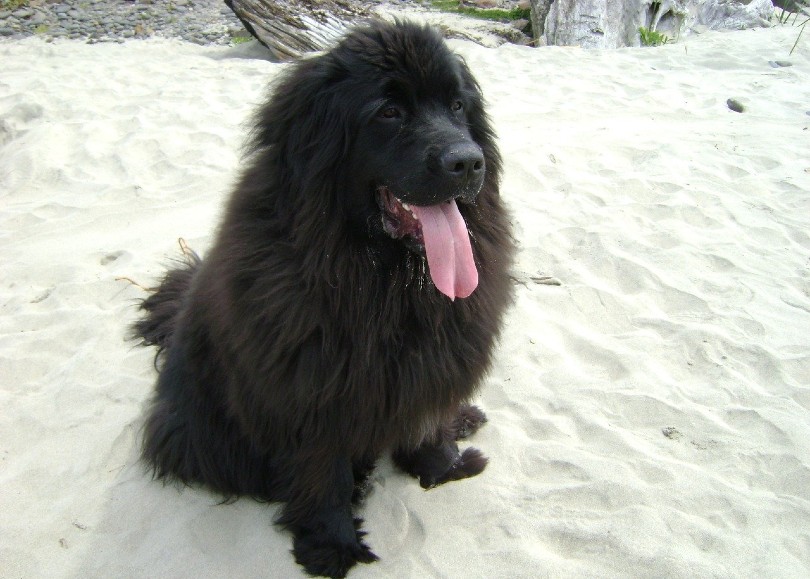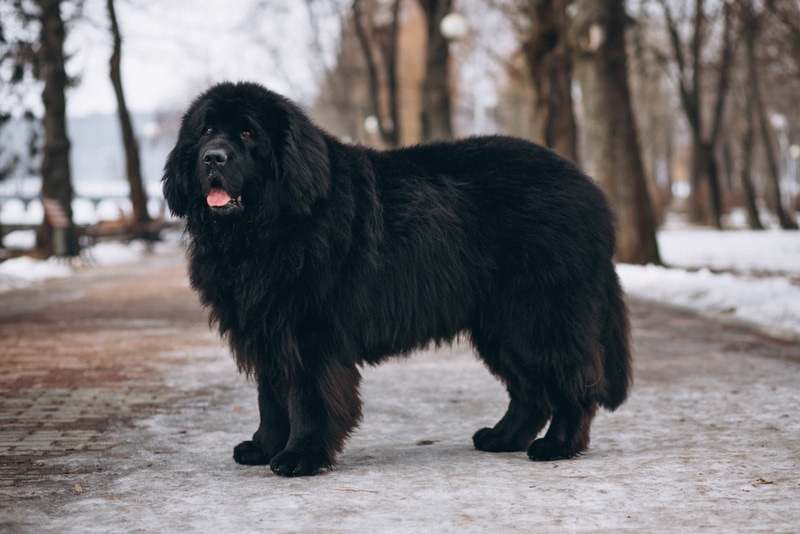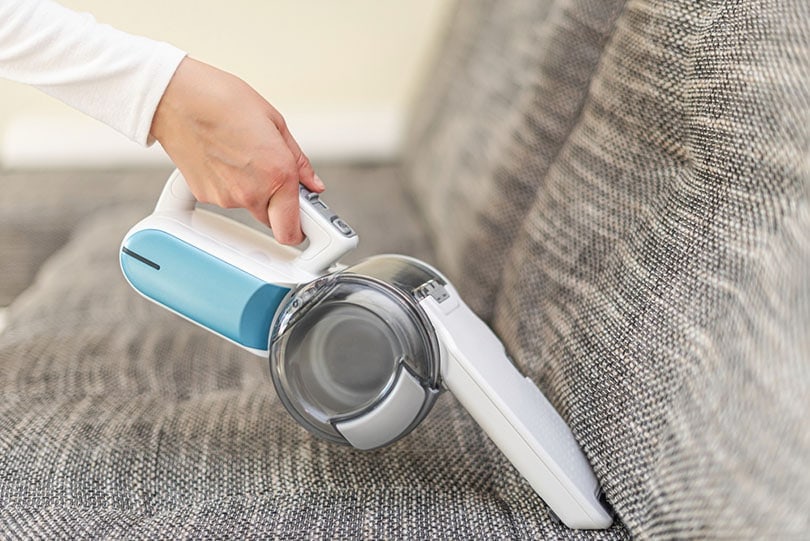Are Newfoundland Dogs Hypoallergenic? Vet-Reviewed Facts

Updated on

Click to Skip Ahead
Newfoundland dogs are a large, strong breed of dog that is known for their intelligence, loyalty, and strength. They have become increasingly popular in recent years due to their calm demeanor and ability to be trained easily. However, if you suffer from pet allergies but are looking to get one of these dogs, you may be wondering if Newfoundland dogs are hypoallergenic?
Unfortunately, Newfoundland dogs are not hypoallergenic, so they aren’t the best choice for people with allergies.
Let’s learn more about why this is the case, what breeds are hypoallergenic, and how you can reduce allergens in your home.
What Is a Hypoallergenic Dog?
Before we answer this question about Newfoundland Dogs specifically, it’s important to understand what a hypoallergenic breed actually is. This topic remains controversial and there are varying opinions on the matter, but we will present you with all the facts so you can be informed and decide for yourself. A hypoallergenic breed is one that presumably produces fewer allergens than other breeds, which might make them less likely to trigger allergies in people with sensitivity issues. Many pet owners who suffer from allergies opt for these breeds in order to reduce their risk of having unpleasant and persistent allergy symptoms or even an allergic reaction.
Research conducted in 2011 failed to prove that hypoallergenic dog breeds actually exist since no significant difference in allergen shedding was found between so-called hypoallergenic breeds and other breeds.1 Despite popular belief, pet allergies aren’t caused by dog fur, but are actually caused by a protein found in the dander of dogs. Dander consists of tiny flakes of dead skin cells and can be spread by shedding fur. All dogs produce different amounts of dander, and some dogs shed less than others. However, even hairless dogs shed dander.
The protein that causes allergies can also be found in a dog’s saliva, feces, and urine. All dogs produce saliva, feces and urine, which is why there is no dog that is 100% hypoallergenic. If you suffer from allergies, speak to your doctor first. Dog allergens have been found in many indoor and outdoor environments even without the presence of dogs, and this will play a role in allergies as well.

Are Newfoundland Dogs Hypoallergenic?
Unfortunately, the answer is no. Newfoundland Dogs are not hypoallergenic due to their thick coats that shed excess hair year-round, thus spreading dander year round as well. They also drool more than other dogs. If you or someone in your family has allergies, it’s best to avoid this breed or find another type of dog that is more suitable for your needs.
What Dogs Are More Hypoallergenic?
Fortunately, there are some other breeds that may be better suited for people with allergies. How hypoallergenic a specific dog is may depend on the individual dog and person. Not all dogs produce the same proteins in the same amounts, so some people can be allergic to a specific dog, rather than a specific breed. However, some of the more appropriate breeds for people suffering with pet allergies may include the Poodle, Bichon Frise, Shih Tzu, Maltese, and Portuguese Water Dog. All of these breeds shed less so are thought to release fewer allergens in the environment than Newfoundland dogs and are much less likely to trigger an allergic reaction in sensitive individuals. If you’re looking for a hypoallergenic breed of dog, one of these would be a good choice.
If you’re looking for a larger breed that is more hypoallergenic, there are a few options to consider. The Goldendoodle and the Labradoodle both have coats that shed less and might produce fewer allergens in the environment than Newfoundland dogs, making them better choices for people with allergies. This is because they are a hybrid breed consisting of a Golden Retriever or a Labrador Retriever mixed with a Poodle, so they have a lower-shedding coat. But they are still not 100% hypoallergenic, as allergens are found in saliva, urine, and feces as well as skin.
How Can I Reduce Allergens in My Home If I Get a Newfoundland?
If you’re determined to get a Newfoundland despite the potential for allergies, consider speaking to your doctor first. There are a few steps that you can take in order to reduce allergens in your home. Bathing your pet regularly will help reduce airborne allergens, as well as vacuuming and dusting frequently. You should also be sure to keep up with regular grooming and brushing in order to keep your dog’s coat clean and free of excess fur.

The 14 Tips for Controlling Your Allergies When You Have a Newfoundland
- Consider seeing your doctor and/or an allergy specialist if you have allergies, especially if your allergies remain severe or persistent even after taking the following steps to reduce exposure to allergens in your home.
- Keep your pet clean and groomed regularly.
- Vacuum and dust your home frequently to reduce allergens in the air.
- Use HEPA air filters for heating and air conditioning in all of your rooms to help clear the air.
- Avoid cuddling or sleeping with your pet, as this can increase exposure to allergens.
- Consider having one “dog-free” room in your house, ideally your bedroom, so you can minimize exposure to allergens when you’re resting.
- Always wash your hands after touching or playing with your dog or in case of them licking your hands.
- If you’ve been around your dog or other dogs for a long period of time, change your clothes right after to reduce your allergy symptoms.
- Invest in a HEPA filter vacuum cleaner for deep cleaning carpets and upholstery that trap allergens and dirt more easily than regular vacuums do.
- Wear a face mask while grooming or bathing your Newfoundland to minimize contact with allergens on their fur and skin particles that may become airborne.
- Use appropriate dog shampoos and pet-safe detergents when washing your pet’s bedding, toys, and other items.
- Have someone who isn’t allergic to animals groom or bathe your Newfoundland so that you don’t have to come into contact with the allergens yourself.
- Cover bedroom vents with a dense filtering material like cheesecloth since air conditioning and heating can spread dander and other allergens throughout your home.
- Make sure your house is well ventilated and keep windows open for at least one hour daily.
How to Properly Groom Your Newfoundland to Control Allergies
When it comes to grooming your Newfoundland, it’s important to do it regularly and set up a weekly and sometimes even daily routine. Use the right techniques in order to minimize contact with allergens. Consider taking your dog to the groomer regularly or get a non-allergic person to help, as this way, the dander falling from excess shedding fur will not contaminate your house and clothes. You will also be able to avoid direct contact with it, reducing your symptoms of allergies.
Alternatively, if you’d prefer to do this yourself, groom your dog outside of your home and dispose of any excess hair appropriately straight away. To do this, start by brushing your pet regularly using a slicker brush or deshedding tool. This will help remove any loose fur and dander that could become airborne. You can also dampen your dog’s fur slightly in order to prevent airborne spread of dander around the home. Next, you could bathe your dog every few weeks using a safe vet-approved or hypoallergenic shampoo. Do not do it more frequently, as this might disrupt their delicate skin oil balance and lead to skin irritation and dryness that might actually worsen shedding. The usual recommendation, depending on length of coat, is to wash a dog every 4-6 weeks. Washing more frequently might reduce allergens present on the dog’s fur from dander, but might also negatively impact your dog’s skin, so you should discuss this with your vet first.
Finally, make sure to protect your dogs against external parasites, such as fleas and ticks, since these can also cause bites and allergic reactions in some people. Consider wearing a mask and changing your clothes as soon as you finish with the grooming. If you are not sure how best to groom your dog, speak to a professional canine groomer or your vet.
Although no pet is completely hypoallergenic, regular bathing can help reduce the amount of dander and other allergens in their fur and the air. We highly recommend Hepper's Oatmeal Pet Shampoo for this job!
- Only Natural Pet Shampoo - Our vegan, plant-based formulation is made with safe and natural...
- No Soap - A cat and dog wash free from soaps, glutens, dyes, DEA, sulfates and phthalates means it's...
What Kind of Care Does a Newfoundland Need?
Newfoundlands are a powerful and strong multipurpose working breed, but they do require some special care to stay healthy and happy. Like all dogs, they need plenty of exercise, mental stimulation, and socialization in order to stay active and to avoid boredom. They also require regular brushing and bathing as well as nail trimming. And, due to their thick coats, Newfoundlands have an increased risk for developing skin inflammation and/or infections, often referred to as “hot spots,” so it’s important that you check them regularly for any signs of skin irritation, discharge, odor, or discomfort.
Lastly, it’s important to keep up with all recommended vaccinations and parasite prevention measures in order to keep your pet healthy. Speak to your vet about how to best care for your Newfoundland.
Overall, Newfoundland dogs are not considered hypoallergenic dogs, and despite being great companions, they are mostly not suitable for people with allergies.
Conclusion
Though Newfoundland dogs may not be a hypoallergenic breed, they are still one of the most popular breeds of dogs thanks to their gentle nature and intelligence. With the right methods to reduce allergens in your home, it might be possible to have a dog and manage your allergies at the same time. Speak to your doctor for recommendations on how to avoid or minimize allergy symptoms with the appropriate treatment. But if you or someone in your family has severe pet allergies and you are considering getting a dog, there is no dog breed that can be recommended over others. Owning a dog can bring a lot of joy, but it is also a big responsibility and takes a lot of time and effort every single day. Minimizing or avoiding contact with your dog if you are suffering from pet allergies might prove very challenging for both of you, so make sure you have made the best decision for you and your health, but also for the dog.
Featured Photo Credit: inside4, Pixabay













